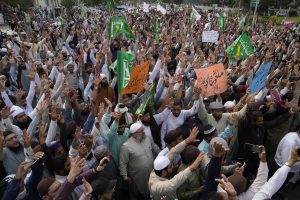Assistant Superintendent of Police Sheher Bano Naqvi in Lahore, Pakistan, has earned widespread praise for her courageous act of saving the life of a woman accused of blasphemy last week. She has been hailed in Pakistan and abroad for putting her life in danger to save a woman from an angry mob, which targeted the woman, misinterpreting the Arabic calligraphy on her clothes as verses from the Quran, and accusing her of committing blasphemy.
Blasphemy is a highly sensitive and dangerous subject in Pakistan. Accusations of blasphemy have often led to violent assaults and mob killings in Pakistan. Hundreds of Pakistanis have landed behind bars on blasphemy charges and dozens, including former Governor of Punjab Salman Taseer, have been killed.
Naqvi’s act of bravery in defending a woman against the wrath of a mob has ignited hope that the issue of blasphemy can be effectively addressed if the state and police authorities firmly confront the extremists and their supporters.
The recognition and support from the country’s institutions and politicians for the police officer’s actions is unprecedented and significant. Following the incident, Naqvi met with Pakistan’s Army Chief Lt. General Syed Asim Munir, who commended her for her selfless devotion to duty and professionalism. This meeting was seen as not only reassuring law enforcement agencies and their officers that they have the support of the army, but also it sent a clear message to the radicals that their actions will not be tolerated.
Following the army chief’s meeting with the police officer, Saudi Arabia’s Ambassador to Pakistan Nawaf bin Saeed Al Maliki met Naqvi at the Saudi Embassy in Islamabad. In recognition of her bravery, he invited her to visit the Kingdom as a royal guest. The unexpected meeting between the officer and the ambassador of Saudi Arabia demonstrated the Kingdom’s rising stakes and interest in Pakistan.
The positive attention that Naqvi’s action garnered underscores a new rejection by both Pakistani and Saudi authorities of violent acts carried out by Islamist radicals in the name of Islam.
It is pertinent to mention that under Crown Prince Mohammed Bin Salman, Saudi Arabia has challenged the Wahhabi religious establishment of the kingdom in recent years, claiming that its extreme conservatism is problematic and frequently stems from erroneous interpretations of Islamic texts.
In the past, right-wing elements in Pakistan gained prominence and power due to Saudi Arabia’s sponsorship of the Wahhabi sect and radical Islamist leaders to the point that they opposed any reforms they believed to be incompatible with their ideological goals. These groups have functioned as blasphemy propagandists over the years, using violence and vigilantism to deal with those they accuse of blasphemy.
This may not be feasible anymore because Saudi Arabia’s interests, both within the country and in nations like Pakistan, are increasingly oriented toward promoting concepts that are seen as liberal and progressive.
For example, Pakistani Islamist radicals pose a significant challenge to Saudi Arabia’s potential normalization of ties with Israel and the anticipated ripple effect on Pakistan. Pakistani radicals could hinder the alignment of the country’s powerful military or other interested parties with Saudi policy. This internal resistance could complicate Pakistan’s decision-making process regarding its stance on the Palestine issue and the potential normalization of ties with Israel.
It appears that the Kingdom is intent on reshaping the trajectory of Pakistan-Saudi relations, signaling a departure from accommodating right-wing Islamists. The recent meeting between the Saudi envoy and the Pakistani police officer has conveyed a strong message to Pakistani Islamists that Saudi Arabia is shifting toward a more progressive stance.
This move not only sets the tone for Pakistan-Saudi relations but also serves as a clear indication to domestic Islamists within Saudi Arabia that the Kingdom remains committed to the reform initiatives spearheaded by Crown Prince Salman. This shift may have implications for right-wing forces in Pakistan, who traditionally seek moral guidance and support from Saudi Arabia.
Saudi Arabia’s gesture of applauding the Pakistani police officer for standing up to Islamist radicals will boost the expectations of Pakistanis looking to Saudi Arabia to subdue Islamists in Pakistan.

































